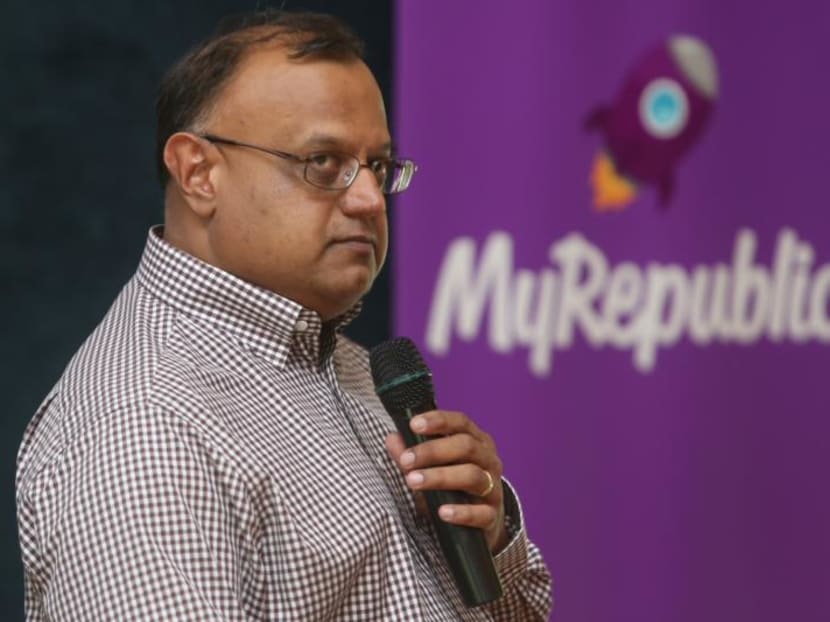MyRepublic promises unlimited mobile data plan, but analysts sceptical
SINGAPORE — MyRepublic has taken another stab at wooing subscribers for its potential entrance to the telco market by dangling discounts for its mobile data plans for early birds, even though the spectrum auction for Singapore’s fourth telco is still more than three months away.
SINGAPORE — MyRepublic has taken another stab at wooing subscribers for its potential entrance to the telco market by dangling discounts for its mobile data plans for early birds, even though the spectrum auction for Singapore’s fourth telco is still more than three months away.
If it succeeds in entering the market, the unlimited data plan it had promised to offer since 2014 will cost S$80 a month — within the S$70 to S$80 price range it floated previously. Existing and new fibre broadband customers will get a 25 per cent discount (S$60). Those who signed up before Sept 30 last year will get 12 months of free unlimited mobile data, it had promised previously.
Its 2GB mobile data plan will cost S$8 a month, with every GB of excess data consumed costing S$8. Existing and new broadband customers will pay S$6 for the same plan.
MyRepublic’s prices for these two mobile data plans are set to be among the lowest vis-a-vis the competition.
Currently, all three incumbent telcos — Singtel, StarHub and M1 — offer 2GB mobile data plans at S$19.90 a month, more than double the cost of MyRepublic’s proposed plan.
They all scrapped 12GB mobile data plans in 2012 within months of each other. However, SingTel has a 10GB plan now priced at S$49.90 a month, with the data bill capped at S$188. M1 offers an 11GB plan at S$50.90 per month (with the data bill capped at S$188.32), while StarHub’s 11GB plan costs S$51 (with the data bill capped at S$85.60).
MyRepublic’s move on Wednesday sparked a retort by competing bidder OMGTEL. OMGTEL was formed by local tech firm Consistel for the purpose of the spectrum bidding that will likely be held in the third quarter of this year.
Noting that further details of the bid are yet to be announced by the authorities, Consistel chairman Masoud Bassiri said: “It’s too early to make such promises.”
Last month, the Infocomm Development Authority of Singapore (IDA) announced that it was paving the way for a fourth telco here, offering a lower starting bid price for aspiring new entrants for 60MHz of spectrum up for auction. The spectrum rights will start in April 2017, which is the earliest that any new player may begin services.
Mr Bassiri cautioned that promises of unlimited data must be taken with “a pinch of salt”, and specific details, such as the speed and locations covered under the plan, must be made clear. He added that there was a trade-off between “the amount of (capacity) and speed, and volume of data” a company can deliver.
Mr Bassiri was also puzzled by MyRepublic’s intent for announcing its price plans, which he said throws open an opportunity for the incumbent telcos to respond with their own price adjustments. MyRepublic said it hopes the proposed price plans will provide insight into the “different approach” it plans to take if it snags the bid to enter the market. It is also using the opportunity to gather feedback and gauge interest from the public, a spokesman for the firm told TODAY.
The company may also then relook and tweak the plans where necessary in response to the feedback received should they win the bid, the spokesman added. “We want to ... (see) how will people take to it, what would they tell us, (and) what do they want.”
Telecommunications analyst Foong King-Yew felt it was premature for MyRepublic to announce its plans when details, such as the amount the winning bidder would have to fork out to enter the market, are not yet known. “(This) package could be very far away from the actual package that they would launch,” said the research vice-president for telecommunications at technology research firm Gartner.
Mobile plans that would set off a price war, he added, would not be “a wise move”, and new entrants should instead seek ways to be creative in their pricing and bundling strategies. “Existing players have more resources to react to any price wars,” he said.
In an interview with Bloomberg TV last month, Singtel Group CEO Chua Sock Koong had expressed concern that a fourth telco’s entry would drive the focus of the competition to pricing only and hurt the industry.
“The only way (a fourth telco) can gain customers will be by way of reducing prices ... The existing operators would look at how best to respond. Clearly just leading prices down, it’s not good for the sustainability of the industry,” she had said.









